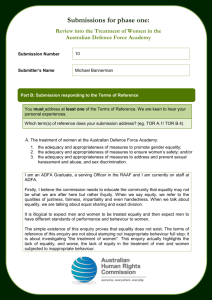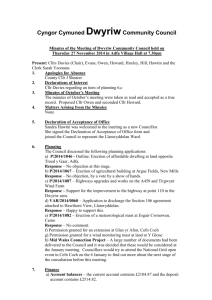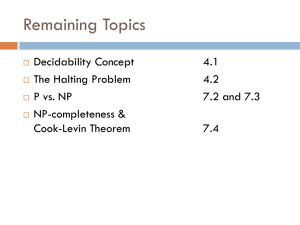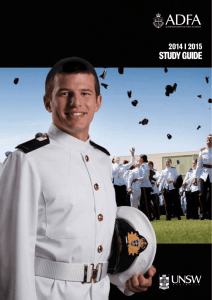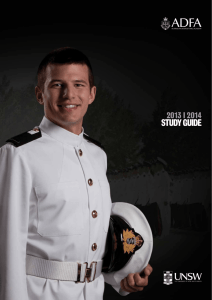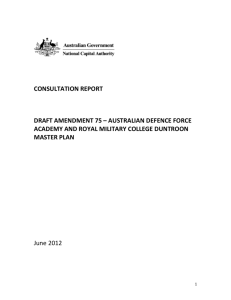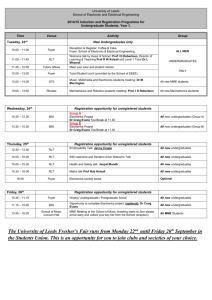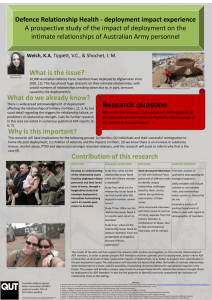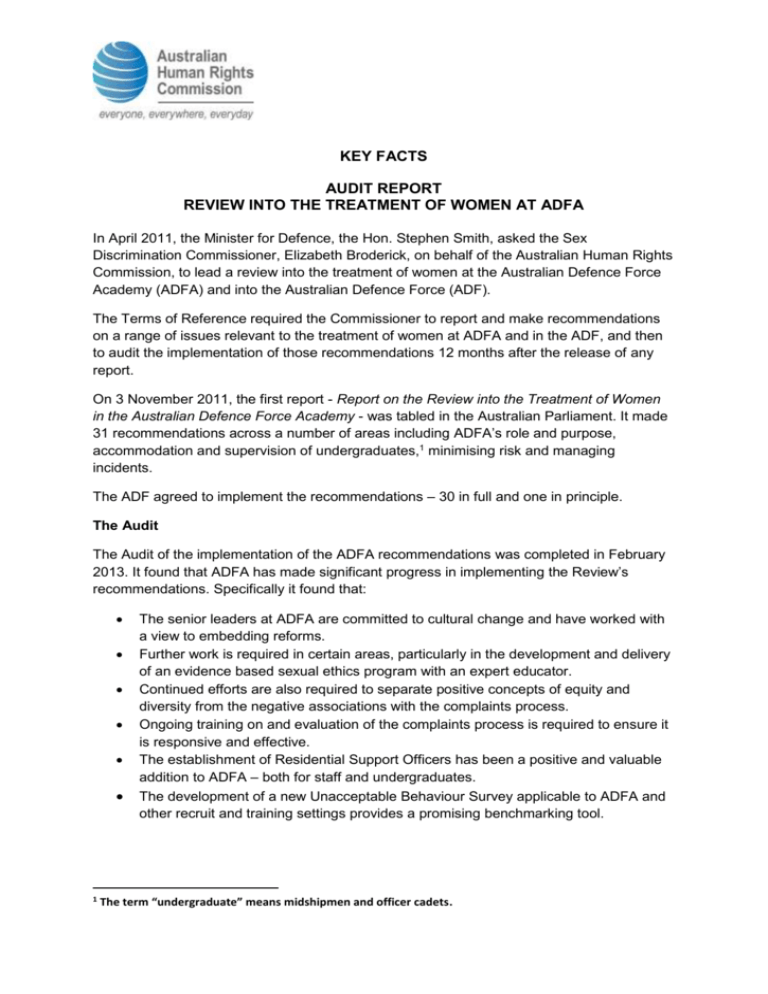
KEY FACTS
AUDIT REPORT
REVIEW INTO THE TREATMENT OF WOMEN AT ADFA
In April 2011, the Minister for Defence, the Hon. Stephen Smith, asked the Sex
Discrimination Commissioner, Elizabeth Broderick, on behalf of the Australian Human Rights
Commission, to lead a review into the treatment of women at the Australian Defence Force
Academy (ADFA) and into the Australian Defence Force (ADF).
The Terms of Reference required the Commissioner to report and make recommendations
on a range of issues relevant to the treatment of women at ADFA and in the ADF, and then
to audit the implementation of those recommendations 12 months after the release of any
report.
On 3 November 2011, the first report - Report on the Review into the Treatment of Women
in the Australian Defence Force Academy - was tabled in the Australian Parliament. It made
31 recommendations across a number of areas including ADFA’s role and purpose,
accommodation and supervision of undergraduates,1 minimising risk and managing
incidents.
The ADF agreed to implement the recommendations – 30 in full and one in principle.
The Audit
The Audit of the implementation of the ADFA recommendations was completed in February
2013. It found that ADFA has made significant progress in implementing the Review’s
recommendations. Specifically it found that:
1
The senior leaders at ADFA are committed to cultural change and have worked with
a view to embedding reforms.
Further work is required in certain areas, particularly in the development and delivery
of an evidence based sexual ethics program with an expert educator.
Continued efforts are also required to separate positive concepts of equity and
diversity from the negative associations with the complaints process.
Ongoing training on and evaluation of the complaints process is required to ensure it
is responsive and effective.
The establishment of Residential Support Officers has been a positive and valuable
addition to ADFA – both for staff and undergraduates.
The development of a new Unacceptable Behaviour Survey applicable to ADFA and
other recruit and training settings provides a promising benchmarking tool.
The term “undergraduate” means midshipmen and officer cadets.
Key Findings
‘Accommodation and Supervision’
The new Residential Support Officers (RSO) scheme in the accommodation
areas has been a success. Undergraduates and staff report that the scheme
is a valuable addition.
The 2012 Unacceptable Behaviour Survey showed around 45% of women
and 20% of men experienced unacceptable behaviour in the residential areas
of ADFA in the previous 12 months. Further work addressing security and
safety in the residential areas is required.
‘Sexual Ethics’ and ‘Data’
Progress on designing and implementing a sexual ethics and healthy
relationships training package has been slow and an expert program was not
in place in 2012.
The number of complaints made in 2012 and 2013 has increased, which may
suggest a safer reporting environment, but there is still a stigma attached to
complaining.
The new Unacceptable Behaviour Survey was administered for the first time
at ADFA and RMC Duntroon in late 2012 and will be rolled out to other
Defence institutions during 2013.
ADFA’s complaints and incidents registers are much improved, and regular
reports are provided to leadership.
‘Equity and Diversity’
The Commandant has worked to promote the concepts of equity and diversity
as positive values however some training in equity and diversity still aligns it
with unacceptable behaviour and the complaints process.
Continued efforts are required to separate these concepts from the complaints
process. Equity and diversity should be consistently taught as core values
underpinning ethical leadership.
‘Structure and Staffing’
The right staff are vital in setting the tone and culture at ADFA. The
Commandant now has an enhanced role in the selection of staff at ADFA but
this is not yet formalised and he is still not the decision maker. The
Commandant should have the right to veto staff selections, or at the very
least, be able to interview staff before the posting decision is made.
The Services have not delegated authority to the Commandant to remove
underperforming staff or undergraduates.
‘ADFA’s Role and Purpose’ and ‘Young People and Future Leaders’
There is a lack of clarity among staff and undergraduates about ADFA’s role
within the three Services.
Options for a new mentoring program have been developed. ADFA has not
yet implemented the new program and no timetable for implementation has
been provided.
A comprehensive approach to alcohol management and testing has been
introduced to address excessive alcohol consumption.
‘Advice and Referral’
ADFA has developed posters listing emergency and support contact people
and ‘Useful contacts’ cards.
It is critical that ADFA widely advertise the new Sexual Misconduct Prevention
and Response Office (SeMPRO), including its 24 hour support line, and
facilitate strong linkages with ADFA’s Sexual Offence Support Person (SOSP)
network.
‘Injury, Health and Wellbeing’
Female undergraduates continue to experience a higher injury rate than male
undergraduates. ADFA has undertaken extensive work on injury management
and is addressing the stigma associated with injury. Further measures could
be taken to alleviate the disproportionate injury rate of females compared to
males.
ADFA has taken steps to enhance access to support services for
undergraduates, by displaying posters with contact details of support services
throughout training and accommodation areas and through working to
develop partnerships with external service providers. ADFA should ensure
that these partnerships are developed and that the services are utilised.

